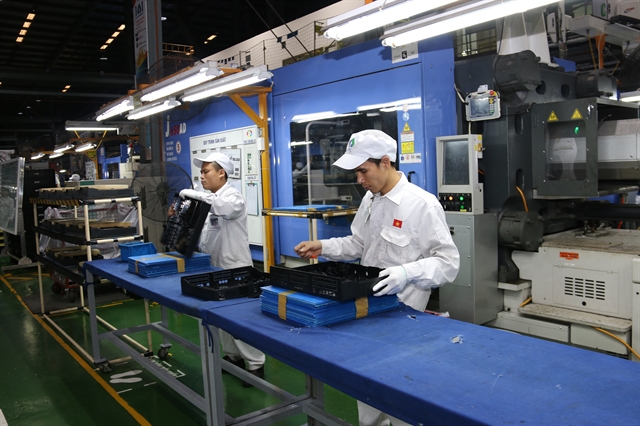 Economy
Economy

The Ministry of Industry and Trade (MoIT) will pay greater attention this year to the implementation of projects manufacturing products in supporting industries, as many opportunities have appeared for Việt Nam to bolster production and exports.

|
| A production line at Hà Nội Plastics Joint Stock Company - one of the leading producers in plastics support industry. Some Vietnamese enterprises boast relatively good capacity in producing moulds, bicycle and plastic. — Photo courtesy of the firm |
HÀ NỘI — The Ministry of Industry and Trade (MoIT) will pay greater attention this year to the implementation of projects manufacturing products in supporting industries, as many opportunities have appeared for Việt Nam to bolster production and exports.
The COVID-19 pandemic has been a blow to the country’s economy and manufacturing sector, triggering a constant shortage of materials along with difficulties and congested delivery for finished products.
To address the problems, many Vietnamese firms are seeking domestic partners in material production and supporting industries, in a bid to save cost and time as well as improving quality.
A host of free trade agreements (FTAs) have created optimal conditions for an influx of investment into Việt Nam as investors try to access preferential tariffs.
Foreign enterprises operating in Việt Nam have taken the initiative in restructuring production value chains or switching to supporting industries, according to the MoIT.
In addition, businesses in the field raised their quality and sharpened their competitive edge. Việt Nam ranked eighth in the 2021 Agility Emerging Markets Logistics Index, up three places compared to 2020.
The index is an annual snapshot of industry sentiment and a ranking of the world’s 50 leading emerging markets by size, business conditions, infrastructure, and transport connections.
This year, the Việt Nam Industry Agency under the MoIT will review manufacturing projects, especially major endeavours in industrial products for export. It will team up with agencies to attract investment, bolster global production chains, and capitalise on trade agreements.
It will also carry out procedures for infrastructure investment for two centres facilitating industrial development in northern and southern regions, along with working with localities that possess advantages in this regard, to discuss appropriate policies.
These centres will help supporting industries boost innovation and technology transfer, improve productivity and quality, increase added value in their products, and take part in global supply chains.
Prime Minister Nguyễn Xuân Phúc signed Resolution No 115 last year on measures to further propel supporting industries, setting out development goals for the next decade.
Vietnamese enterprises must be able to produce highly-competitive support products, meeting 45 per cent of essential needs for domestic production and consumption and accounting for about 11 per cent of industrial production value by 2025.
About 1,000 enterprises are to be capable of direct supply to assembly enterprises and multinational corporations, with domestic enterprises to account for about 30 per cent by 2025.
By 2030, support products will meet 70 per cent of demand and account for about 14 per cent of industrial production value. Some 2,000 companies are to be capable of supplying directly to assemblers and multinational corporations by 2030.
Vietnamese businesses operating in supporting industries have developed in both quantity and quality in recent years, with improved production capacity and increasing engagement in global production chains.
In a recent report submitted to the National Assembly Standing Committee and legislators, the Government cited statistics showing that companies in supporting industries account for nearly 4.5 per cent of all manufacturing and processing businesses and have created more than 600,000 jobs, equivalent to 8 percent of the workforce in the manufacturing and processing sector. Their net revenue now tops VNĐ900 trillion (US$38.9 billion), or about 11 per cent of the sector’s total.
Some Vietnamese enterprises boast relatively good capacity in producing moulds, bicycle and motorbike components, electrical cables, plastic and rubber components, and tyres, meeting domestic demand and the requirements of foreign importers.
The report noted that supporting industries play a decisive role in restructuring the economy, improving workplace productivity and skills, and promoting the competitiveness and quality of Vietnamese goods and the economy. — VNS




